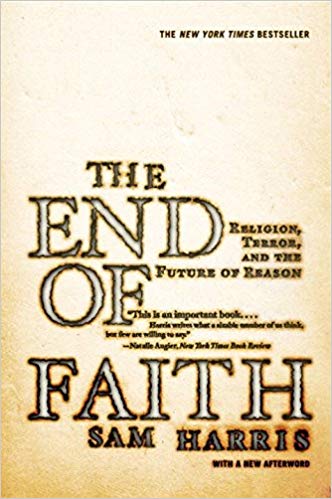
The End of Faith, by Sam Harris, (New York: Norton & Company Ltd., 2004).
I’ve decided I had better read all the so-called “new atheists” before the Age of Obama begins in earnest; something tells me that a more moderate leadership will take some of the wind out of their sails. First on my list is The End of Faith, by Sam Harris.
In fact, this book is not about atheism. There is no carefully plotted account of the virtues of reason, or secular ethics, or empiricism or science. These are assumed. Instead, the book is an extended diatribe against the world’s major religions, most notably Islam. Harris takes a “the enemy of my enemy is my friend” approach and reaches conclusions that might ingratiate him with conservative Christians. While conservative Christians are hostile towards atheists, Harris laces his book with such invective against Islam and reaches such extreme conclusions that there must be at least a few Fundie preachers who take secret delight in his writing.
Notwithstanding a harangue against extremism, Harris reaches an extremism all his own which culminates in this fine passage on page 129:
“What will we do if an Islamist regime, which grows dewy-eyed at the mere mention of paradise, ever acquires long-range nuclear weaponry? If history is any guide, we will not be sure about where the offending warheads are or what their state of readiness is, and so we will be unable to rely on targeted, conventional weapons to destroy them. In such a situation, the only thing likely to ensure our survival may be a nuclear first strike of our own. Needless to say, this would be an unthinkable crime – as it would kill tens of millions of innocent civilians in a single day – but it may be the only course of action available to us, given what Islamists believe.”
Isn’t this the “Bush Doctrine“? And wasn’t it first articulated under the shadow of the religious right? How odd, how hypocritical, given his central thesis which he sets out on page 13: “Intolerance is thus intrinsic to every creed.” (Including atheism, it would appear.)
The End of Faith‘s chief sin is an absence of nuance. This is apparent even on the first page. Harris opens his book by imagining a scenario in which a young man detonates a bomb on a bus, killing himself and countless others. There are many things we can’t say for certain about this young man—education, social standing, popularity. But, Harris asks: “Why is it so easy, then, so trivially easy—you-could-almost-bet-your-life-on-it easy—to guess the young man’s religion?”
This is a rhetorical question. It is rhetorical because it assumes a single answer is possible and assumes its readers already know that single answer. However, it takes little imagination to think of other answers to this question, and the only thing readers can safely assume is that Harris hasn’t thought of them.
Harris assumes we can name the young man’s faith because everybody knows—in fact, it’s axiomatic—that Islam breeds suicidal nut jobs. That’s what it means to follow the teachings of Mohamed. But it is equally plausible to suggest that our knowledge of the young man’s religion comes from tacitly racist portrayals of Islam in Western media. We all buy into assumptions about another people because we have no better information. It’s ironic that a man who assumes the virtues of empiricism does so little to test his own assumptions. Instead of seeking out other (possibly better) accounts, he advocates for the detonation of nuclear devices as a way to address differences.
It’s difficult to detect racism in our public discourse when we’re in the midst of it. Hindsight lets the racial assumptions emerge, but we can also detect them by drawing analogies from historical examples. The Japanese were once vilified in Western media as primitive suicidal nut jobs. Think of “Bugs Bunny Nips the Nips.” Our lovable rabbit hero befuddles simple Japanese soldiers who are portrayed as apelike buffoons. But we’ve done the same thing in our treatment of Islam. Watch the movie True Lies, starring Arnold Schwarzenegger and Jamie Lee Curtis, for an excellent example of racist caricature.
It’s ironic that Harris concludes his book by celebrating the meditative practices of Buddhism—a spirituality nurtured by the Japanese, our former enemies, a people we once caricatured as suicidal nut jobs, a people on whom we dropped nuclear bombs. “If history is any guide … ” says Harris, yet clearly for him it isn’t.
I have found reading Harris a bit like sleeping with a diseased whore; you witness something virulent emerging and then you hate yourself for having participated in it.